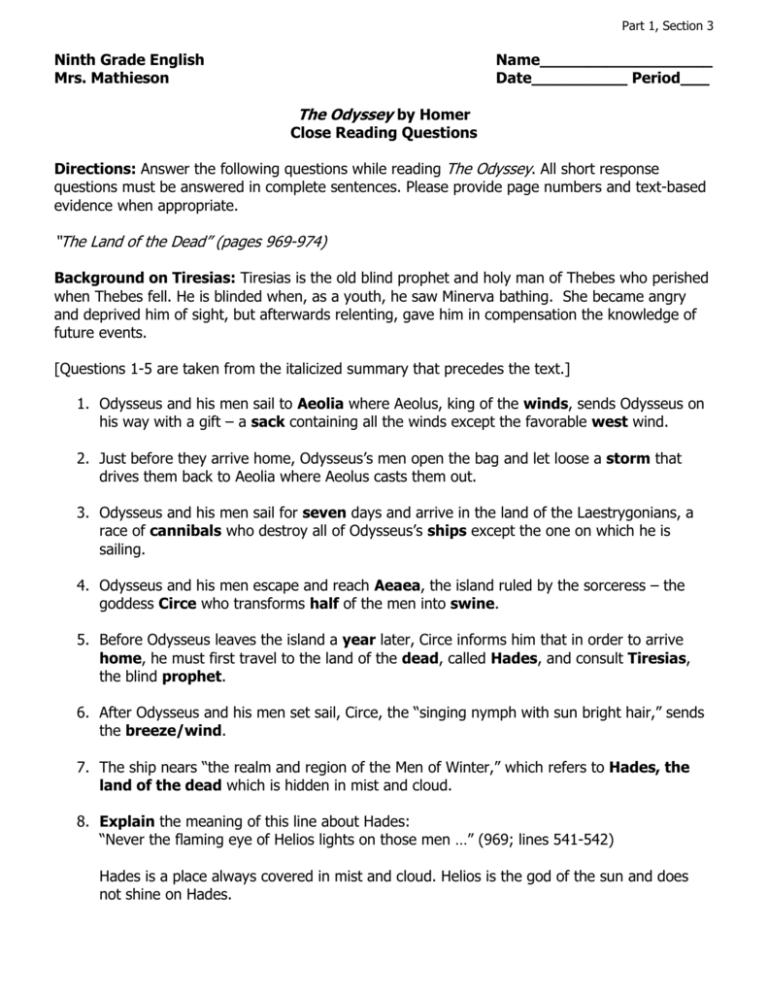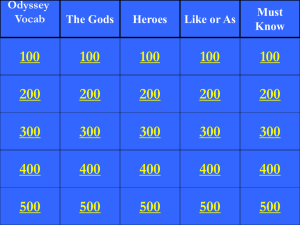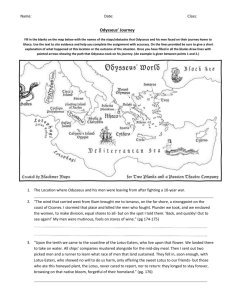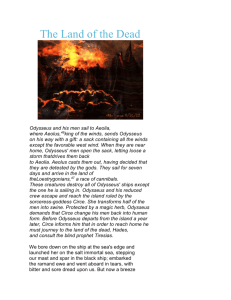Section 3
advertisement

Part 1, Section 3 Ninth Grade English Mrs. Mathieson Name__________________ Date__________ Period___ The Odyssey by Homer Close Reading Questions Directions: Answer the following questions while reading The Odyssey. All short response questions must be answered in complete sentences. Please provide page numbers and text-based evidence when appropriate. “The Land of the Dead” (pages 969-974) Background on Tiresias: Tiresias is the old blind prophet and holy man of Thebes who perished when Thebes fell. He is blinded when, as a youth, he saw Minerva bathing. She became angry and deprived him of sight, but afterwards relenting, gave him in compensation the knowledge of future events. [Questions 1-5 are taken from the italicized summary that precedes the text.] 1. Odysseus and his men sail to Aeolia where Aeolus, king of the winds, sends Odysseus on his way with a gift – a sack containing all the winds except the favorable west wind. 2. Just before they arrive home, Odysseus’s men open the bag and let loose a storm that drives them back to Aeolia where Aeolus casts them out. 3. Odysseus and his men sail for seven days and arrive in the land of the Laestrygonians, a race of cannibals who destroy all of Odysseus’s ships except the one on which he is sailing. 4. Odysseus and his men escape and reach Aeaea, the island ruled by the sorceress – the goddess Circe who transforms half of the men into swine. 5. Before Odysseus leaves the island a year later, Circe informs him that in order to arrive home, he must first travel to the land of the dead, called Hades, and consult Tiresias, the blind prophet. 6. After Odysseus and his men set sail, Circe, the “singing nymph with sun bright hair,” sends the breeze/wind. 7. The ship nears “the realm and region of the Men of Winter,” which refers to Hades, the land of the dead which is hidden in mist and cloud. 8. Explain the meaning of this line about Hades: “Never the flaming eye of Helios lights on those men …” (969; lines 541-542) Hades is a place always covered in mist and cloud. Helios is the god of the sun and does not shine on Hades. Part 1, Section 3 9. After Odysseus and his men land, they make a sacrifice by pouring libations (see side note) to the dead. 10. Odysseus pledges to slaughter his best hiefer for the dead when he arrives home. He also swears to sacrifice a black lamb for Tiresias. a. Why does he “pledge these rites” (line 561)? Odysseus pledges these rites to calm the nations of the dead. b. Define assuage: Assuage means to calm or pacify. 11. The souls gather around the sacrifice after coming from Erebus, a dark region under the earth through which the dead pass before entering Hades. 12. Describe the types of souls who gather. a. b. c. d. brides young men men grown old in pain tender girls whose hearts were new to grief 13. How does Odysseus react to this gathering? Odysseus’ reaction to this gathering is that he grows sick with fear. 14. He crouches, draws his sword, and awaits Tivesias. 15. The first soul (shade) to come to Odysseus is Elpenor, a former shipmate of his. a. What has caused his untimely death? Elpenor drank too much and went to sleep on Circe's roof. He missed the ladder climbing down, fell, and broke his neck. b. Odysseus’s men had left Elpenor dead and unburied in Circe’s hall. c. Thus, Elpenor makes one request of Odysseus. What is it? Elpenor asks Odysseus to bury him. d. What is Odysseus’s response? Odysseus promises to bury Elepenor. 16. The next shade to approach Odysseus is Anticlea, his mother. Part 1, Section 3 a. Why is Odysseus surprised to see her in Hades? Odysseus is surprised to see his mother because when he left Ithaca for Troy, she was alive. b. How does he react to her ghost? Odysseus cries, but he holds his mother's ghost off and doesn't allow her approach him. 17. Finally, the prince of Thebes Tiresias approaches Odysseus, carrying a golden staff. 18. Before Tiresias speaks, he tastes the blood in order to speak the truth. 19. Tiresias foretells that “anguish” lies ahead for Odysseus and his men on their journey home. Define anguish: Anguish is great pain or suffering. 20. Tiresias’s prophecy includes the following troubles: a. The god who thunders on land, Poseidon, will cause trouble because Odysseus has blinded his son Polyphemus. b. Odysseus and his men will be tempted to eat the kine/cattle of Helios, the sun god. c. If the beeves (herds) are destroyed, Odysseus’s army will be destroyed and only Odysseus will survive. d. The “narrow strait” that will take Odysseus and his men through the troubles is symbolically “denial of yourself and restrain of his shipmates (973, line 638). 21. Summarize Tiresias’s predictions for Odysseus once he arrives home alone through the end of his life. (about five events) a. He will arrive home on someone else's boat. b. His household will be filled with men trying to court his wife and eating his food. c. He will make those men pay with their lives. d. When it is done, he will walk on land with an oar until he comes to where men don't know the sea and offer a sacrifice. e. He will die by the sea and it will be soft.









